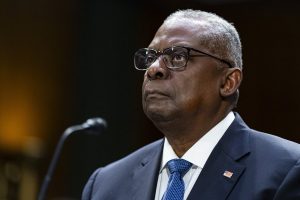Joe Biden tapped retired army general Llyod Austin as his Defence Secretary in December 2020. The four-star general is the first African-American to be the Pentagon’s Chief. The 67-year-old was the US commander in Iraq and then the head of the US Central Command, covering all of the Middle East from 2010 to 2016 when Biden was vice president.
Austin will take charge of an institution where racial minorities are overrepresented in the lower ranks but rare at the top.
Talking about Austin, Biden had said, “Throughout his lifetime of dedicated service — and in the many hours we’ve spent together in the White House Situation Room and with our troops overseas — General Austin has demonstrated exemplary leadership, character, and command.”
“He is uniquely qualified to take on the challenges and crises we face in the current moment,” Biden, the oldest President in US history, added.
He was a surprise choice for secretary of defense, bypassing a highly qualified former senior Pentagon civilian official, Michele Flournoy.
No sooner Austin’s confirmation hit the floors, critics, left unimpressed, jeremiad Biden’s decision to choose a recently-retired general to supervise an army sometimes accused of having too much influence.
ALSO READ | Dr Jill Biden: Future First Lady says ‘Teaching is not what I do. It’s who I am’
However, the Biden campaign dubbed Austin “a trusted and crisis-tested leader who has overseen some of the most complex and impactful operations in the history of the armed services.”
“I look forward to once again working closely with him as a trusted partner to lead our military with dignity and resolve, revitalise our alliances in the face of global threats, and ensure the safety and security of the American people,” Biden said in the statement.
Reportedly, the Biden-Austin duo fused together through Biden’s son Beau, who died of cancer in 2015 after fighting in Iraq under Austin’s command.
Graduating from West Point Military Academy, Austin spent four decades in the army. Before his stint with the army, he had a career with a wide range of assignments, from leading platoons to running logistics groups, overseeing recruiting and senior Pentagon jobs.
In March 2003, he was the assistant commander of the 3rd Infantry Division when it marched from Kuwait into Baghdad in the US invasion of Iraq.
ALSO READ | Joe Biden has named 20 Indian-Americans for his administration, 17 for key White House positions
From late 2003 to 2005, he was in Afghanistan commanding the Combined Joint Task Force 180, the principle US-led operation seeking to stabilize the security situation in the country.
In 2010, he was made commanding general of US forces in Iraq, and two years later became the commander of the Central Command, in charge of all Pentagon operations in the Middle East and Afghanistan.
That put him in charge of the fight against Islamic State militants as they captured large swathes of Iraq and Syria.
Since retiring, Austin has been on the board of one of the Pentagon’s largest weapons suppliers, Raytheon, as well as other companies.
He also was part of a small group of shareholders in an investment group, Pine Island Capital Partners, that included Biden’s pick for secretary of state, Antony Blinken, and his rival for the Pentagon job, Flournoy.





